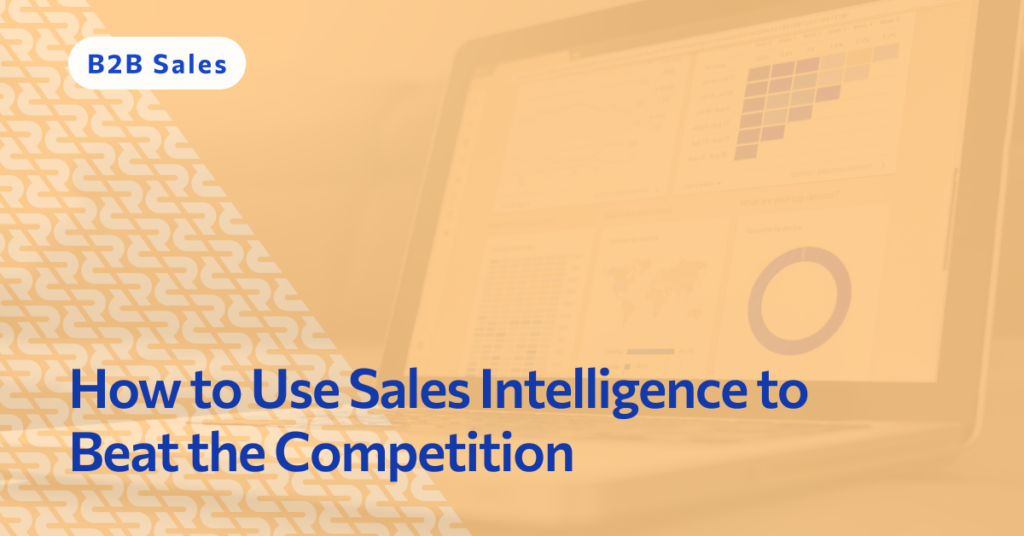How to Use Sales Intelligence to Beat the Competition

Today’s business world—sales included—is data-driven and data-informed. As such, companies need sales intelligence to understand their market and customers, differentiate from competitors, and make strategy decisions rooted in smart, objective insights. Sales intelligence software tools are the main avenue for doing so.
In this article, we’ll explore 7 effective ways to leverage sales intelligence tools and the insights they deliver to get ahead of your competition. From identifying high-potential prospects and understanding your market to monitoring competitors’ activities and optimizing processes, sales intelligence is a powerful capability that can revolutionize your sales performance.
Let’s dive into the strategies that will help your business achieve success in today’s dynamic sales landscape.
Quick Takeaways
- Sales intelligence is the collection and analysis of data insights to inform sales strategy.
- It can be implemented using automated, AI-powered software tools.
- Using sales intelligence, companies can better understand their sales landscape at every level—individual customers, larger market conditions, competitors, and even potential future scenarios.
- Partnering with a data-driven sales service provider is an effective way to gain access and maximize ROI on sales intelligence solutions.
What is Sales Intelligence?
Sales intelligence is the process of collecting, analyzing, and utilizing data insights to enhance sales strategies and decision-making. It involves gathering information about customers, markets, prospects, and competitors, and it’s largely driven by the use of highly automated, AI-powered data analytics platforms.
Unlike the standard collection and tracking of demographic data and customer information, sales intelligence goes a step further to understand customer and buyer behaviors and preferences as well as larger market trends and conditions.
Sales intelligence leverages a wide variety of sources to generate sophisticated insights, and it makes data approachable using dashboards and data visualizations.
It’s also becoming a competitive imperative—by 2029, the sales intelligence software market is expected to grow exponentially from its 2023 state and reach $6.40B worldwide.

By utilizing sales intelligence, businesses can identify high-potential prospects, prioritize sales efforts, and allocate resources effectively. It also enables organizations to monitor and analyze competitor activities, uncover market gaps, and differentiate their offering more effectively.
Finally, sales intelligence empowers sales teams to track KPIs, measure sales effectiveness, and optimize their strategies. It allows them to make data-driven decisions and identify bottlenecks in the sales process to drive higher efficiency and revenue growth.
Let’s look at 7 ways to implement a sales intelligence strategy that moves your business ahead and sets you apart from your competition.
7 Ways to Be More Competitive with Sales Intelligence
Identify High-Potential Prospects
Sales intelligence can help you go beyond standard ICP and buyer persona data to analyze intent. More specifically, you can use behavior data to get a sense of how ready a buyer is to actually make a purchase.
This allows you to hone in immediately on the leads in your pipeline most likely to convert, making your marketing and sales process more efficient and increasing conversion rates.
At the same time, you can quickly funnel leads at earlier stages of their buyer journey into lead nurturing campaigns.
Understand Your Market
Having a larger understanding of your market helps you understand important factors that contribute to sales success, like total addressable market (TAM) or economic conditions that may impact a company’s ability to buy at a particular time.
Further, you can stay abreast of changing market trends, norms, and buyer preferences to adjust your strategies accordingly.
Sales intelligence tools can mine public data sources like websites, industry reports, social media, and business directories to deliver the wider market insights you need.
Monitor Competitor Activities
A key part of understanding your larger market is knowing your competition. Sales intelligence tools use algorithms and data mining to extract relevant information about competitors’ products, pricing, market positioning, and sales strategies. It can also curate and place the data in dashboards to give you a high-level view of your competition as a whole.
You can use this information to understand their strengths and weaknesses and develop intentional strategies to differentiate your offerings and motivate customers to choose you over other market alternatives.
Optimize Sales Strategies
Sales intelligence tools streamline tracking of important sales KPIs like conversion rates, average deal size, sales cycle length, and more. This information enables companies to identify areas for improvement, address bottlenecks in their sales process, better align with customer needs, and make data-driven decisions that drive results.
Small boosts in efficiency and continuous improvement over time can translate to significant benefits for your sales department, including higher cost savings and sales rep productivity.
Forecast Sales Opportunities
To be competitive in today’s fast-paced business environment, companies need to do more than analyze historical performance data. Instead, they need to use dynamic data combinations to make forward-thinking sales strategy decisions and informed predictions about the future. Sales intelligence tools make this possible.
Using predictive data analytics capabilities and data mining at scale, sales intelligence tools can use your internal data and larger market data to predict how your business will perform in the future based on a range of impact factors and potential scenarios.
Enhance Customer Retention
Sales intelligence tools are better able to identify anomalies in customer feedback, engagement levels, and sentiment. This allows you to take proactive measures to address their concerns and provide better support.
In the long run, you can retain your customers at a higher rate and prevent them from leaving for competitor solutions.
Not only does this keep you ahead of your competition, it makes a significant impact on your profitability potential—it costs significantly more to acquire new customers than retain existing ones, and just a 5% increase in customer retention can result in a 25-95% increase in profit.
Foster Collaboration
Sales intelligence tools are typically cloud-based and thus provide a single source of real-time data truth for your sales team. Teams are better able to share insights and best practices, and they can make decisions based on current, accurate data.
More collaborative sales teams are better able to leverage their collective strengths and networks to improve your strategy and win more business.
Over to You
One of the best ways to access sales intelligence tools and data is to work with a trusted partner who already leverages it in their services. At RevBoss, we use sales intelligence insights aggregated from our own internal knowledge, hundreds of clients we’ve worked with, and over 50,000 client campaigns.
Schedule a call with us to learn how you can use these insights to unlock new sales potential.
